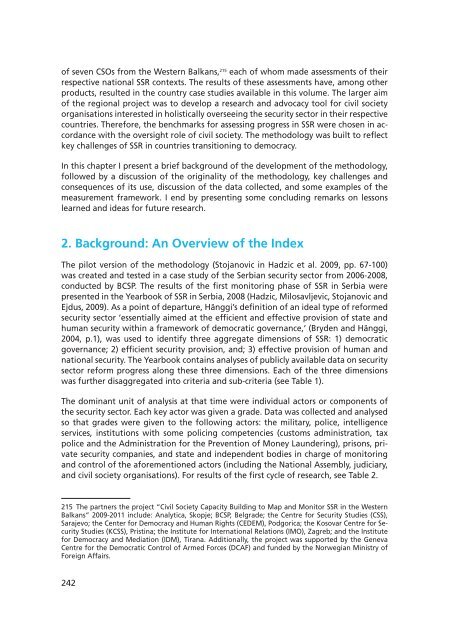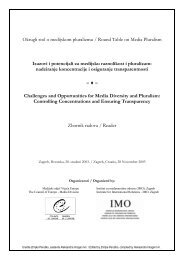almanac on security sector oversight in the Western Balkans
almanac on security sector oversight in the Western Balkans
almanac on security sector oversight in the Western Balkans
You also want an ePaper? Increase the reach of your titles
YUMPU automatically turns print PDFs into web optimized ePapers that Google loves.
of seven CSOs from <strong>the</strong> <strong>Western</strong> <strong>Balkans</strong>, 215 each of whom made assessments of <strong>the</strong>ir<br />
respective nati<strong>on</strong>al SSR c<strong>on</strong>texts. The results of <strong>the</strong>se assessments have, am<strong>on</strong>g o<strong>the</strong>r<br />
products, resulted <strong>in</strong> <strong>the</strong> country case studies available <strong>in</strong> this volume. The larger aim<br />
of <strong>the</strong> regi<strong>on</strong>al project was to develop a research and advocacy tool for civil society<br />
organisati<strong>on</strong>s <strong>in</strong>terested <strong>in</strong> holistically oversee<strong>in</strong>g <strong>the</strong> <strong>security</strong> <strong>sector</strong> <strong>in</strong> <strong>the</strong>ir respective<br />
countries. Therefore, <strong>the</strong> benchmarks for assess<strong>in</strong>g progress <strong>in</strong> SSR were chosen <strong>in</strong> accordance<br />
with <strong>the</strong> <strong>oversight</strong> role of civil society. The methodology was built to reflect<br />
key challenges of SSR <strong>in</strong> countries transiti<strong>on</strong><strong>in</strong>g to democracy.<br />
In this chapter I present a brief background of <strong>the</strong> development of <strong>the</strong> methodology,<br />
followed by a discussi<strong>on</strong> of <strong>the</strong> orig<strong>in</strong>ality of <strong>the</strong> methodology, key challenges and<br />
c<strong>on</strong>sequences of its use, discussi<strong>on</strong> of <strong>the</strong> data collected, and some examples of <strong>the</strong><br />
measurement framework. I end by present<strong>in</strong>g some c<strong>on</strong>clud<strong>in</strong>g remarks <strong>on</strong> less<strong>on</strong>s<br />
learned and ideas for future research.<br />
2 . Background: An Overview of <strong>the</strong> Index<br />
The pilot versi<strong>on</strong> of <strong>the</strong> methodology (Stojanovic <strong>in</strong> Hadzic et al. 2009, pp. 67-100)<br />
was created and tested <strong>in</strong> a case study of <strong>the</strong> Serbian <strong>security</strong> <strong>sector</strong> from 2006-2008,<br />
c<strong>on</strong>ducted by BCSP. The results of <strong>the</strong> first m<strong>on</strong>itor<strong>in</strong>g phase of SSR <strong>in</strong> Serbia were<br />
presented <strong>in</strong> <strong>the</strong> Yearbook of SSR <strong>in</strong> Serbia, 2008 (Hadzic, Milosavljevic, Stojanovic and<br />
Ejdus, 2009). As a po<strong>in</strong>t of departure, Hänggi’s def<strong>in</strong>iti<strong>on</strong> of an ideal type of reformed<br />
<strong>security</strong> <strong>sector</strong> ‘essentially aimed at <strong>the</strong> efficient and effective provisi<strong>on</strong> of state and<br />
human <strong>security</strong> with<strong>in</strong> a framework of democratic governance,’ (Bryden and Hänggi,<br />
2004, p.1), was used to identify three aggregate dimensi<strong>on</strong>s of SSR: 1) democratic<br />
governance; 2) efficient <strong>security</strong> provisi<strong>on</strong>, and; 3) effective provisi<strong>on</strong> of human and<br />
nati<strong>on</strong>al <strong>security</strong>. The Yearbook c<strong>on</strong>ta<strong>in</strong>s analyses of publicly available data <strong>on</strong> <strong>security</strong><br />
<strong>sector</strong> reform progress al<strong>on</strong>g <strong>the</strong>se three dimensi<strong>on</strong>s. Each of <strong>the</strong> three dimensi<strong>on</strong>s<br />
was fur<strong>the</strong>r disaggregated <strong>in</strong>to criteria and sub-criteria (see Table 1).<br />
The dom<strong>in</strong>ant unit of analysis at that time were <strong>in</strong>dividual actors or comp<strong>on</strong>ents of<br />
<strong>the</strong> <strong>security</strong> <strong>sector</strong>. Each key actor was given a grade. Data was collected and analysed<br />
so that grades were given to <strong>the</strong> follow<strong>in</strong>g actors: <strong>the</strong> military, police, <strong>in</strong>telligence<br />
services, <strong>in</strong>stituti<strong>on</strong>s with some polic<strong>in</strong>g competencies (customs adm<strong>in</strong>istrati<strong>on</strong>, tax<br />
police and <strong>the</strong> Adm<strong>in</strong>istrati<strong>on</strong> for <strong>the</strong> Preventi<strong>on</strong> of M<strong>on</strong>ey Launder<strong>in</strong>g), pris<strong>on</strong>s, private<br />
<strong>security</strong> companies, and state and <strong>in</strong>dependent bodies <strong>in</strong> charge of m<strong>on</strong>itor<strong>in</strong>g<br />
and c<strong>on</strong>trol of <strong>the</strong> aforementi<strong>on</strong>ed actors (<strong>in</strong>clud<strong>in</strong>g <strong>the</strong> Nati<strong>on</strong>al Assembly, judiciary,<br />
and civil society organisati<strong>on</strong>s). For results of <strong>the</strong> first cycle of research, see Table 2.<br />
215 The partners <strong>the</strong> project “Civil Society Capacity Build<strong>in</strong>g to Map and M<strong>on</strong>itor SSR <strong>in</strong> <strong>the</strong> <strong>Western</strong><br />
<strong>Balkans</strong>” 2009-2011 <strong>in</strong>clude: Analytica, Skopje; BCSP, Belgrade; <strong>the</strong> Centre for Security Studies (CSS),<br />
Sarajevo; <strong>the</strong> Center for Democracy and Human Rights (CEDEM), Podgorica; <strong>the</strong> Kosovar Centre for Security<br />
Studies (KCSS), Prist<strong>in</strong>a; <strong>the</strong> Institute for Internati<strong>on</strong>al Relati<strong>on</strong>s (IMO), Zagreb; and <strong>the</strong> Institute<br />
for Democracy and Mediati<strong>on</strong> (IDM), Tirana. Additi<strong>on</strong>ally, <strong>the</strong> project was supported by <strong>the</strong> Geneva<br />
Centre for <strong>the</strong> Democratic C<strong>on</strong>trol of Armed Forces (DCAF) and funded by <strong>the</strong> Norwegian M<strong>in</strong>istry of<br />
Foreign Affairs.<br />
242



